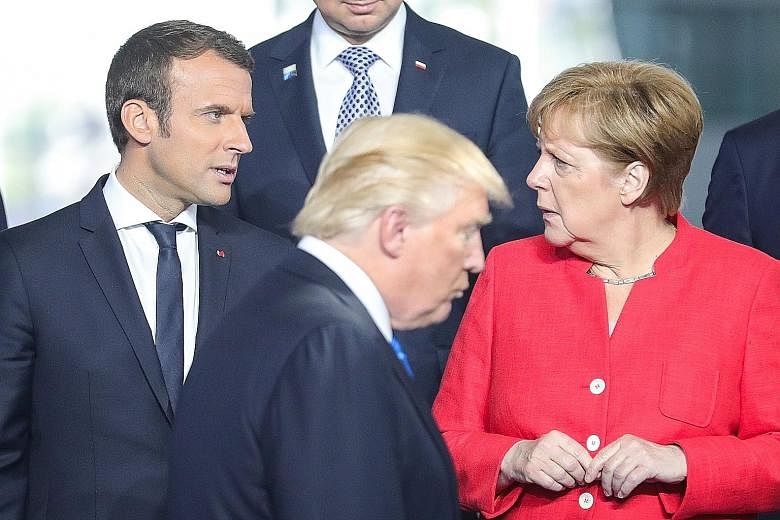BERLIN • The contrast could not have been more stark.
Chancellor Angela Merkel of Germany started Thursday in Berlin with the 44th United States President - the one she has called "dear Barack". She spent the afternoon in Brussels with the 45th, President Donald Trump, whose election she greeted with a stern reminder to respect shared values such as equality and freedom.
Mr Barack Obama was in Berlin to help celebrate 500 years since Martin Luther's Reformation, and received a rock-star welcome from tens of thousands at the Brandenburg Gate. It was all bonhomie, waves and warm words as the former president praised Dr Merkel's "outstanding work, not just here but around the world", particularly with refugees.
Barely two hours later, Dr Merkel was among the European leaders who greeted Mr Trump coolly at Nato headquarters in Brussels, where few casual words, let alone warm ones, were exchanged, as the new American President once again castigated allies for not paying their fair share of bills.
For Europeans, the juxtaposition served as an unavoidable reminder of the contrasts between the men - their personal styles, their relations with America's allies, and the values and priorities they embody.
It was also a demonstration - however coincidental - of the political shadow boxing that has found an unlikely arena in Europe, the new centre of the contest between liberal democracy and far-right populism.

Mr Obama is the leader Europe prefers, while Mr Trump's sudden ascendance has been seen as a challenge to America's commitment to Europe - both its unity and its security - as well as the values that underpin the Western alliance.
The impression was underscored once again on Thursday when Mr Trump demurred from explicitly endorsing America's commitment to Nato's principle of collective defence.
Neither president has remained aloof from Europe's politics as the stakes have mounted this year, with critical elections which have so far beaten back the far-right populism that helped thrust Mr Trump to power last year.
Each man has, in fact, made his preferences clear at important moments in a kind of political proxy war. Mr Obama, who remains wildly popular in Europe, was not shy about weighing in on France's presidential race and endorsing centrist reformer Emmanuel Macron, the winner.
Mr Trump, on the other hand, lauded Mr Macron's far-right opponent, Ms Marine Le Pen, and posted a message on Twitter saying that a terror attack in Paris last month would "have a big effect on presidential election". Ultimately it did not.
For European leaders such as Dr Merkel, striking a balance between coaxing Mr Trump into a deeper understanding with America's traditional allies while remaining true to their own political principles is proving to be tricky.
German government officials say she telephoned Mr Trump when it became clear that she would meet both presidents on the same day to dispel any impression of a slight.
But the coincidence of scheduling - Mr Obama's invitation was issued a year ago, although it was accepted only last month - still presented Dr Merkel with an opportunity to demonstrate that the two sides need each other, and to show voters at home that she is a world leader as she campaigns for a fourth term.
"It is wonderful timing for her, a combination of good luck and good strategising," said Mr Jan Techau of the Richard Holbrooke Forum at the American Academy in Berlin.
Dr Merkel was with Mr Obama, "the good American everyone is already missing", and then with Mr Trump, "the other American who needs to be dealt with. And that is what is so crucial - of course she needs the relationship with Trump, but she can relativise that with pictures with Mr Obama at the church meeting", said Mr Techau.
As for Mr Obama, usually trips by ex-leaders generate little public interest and consist of collecting obscure awards, such as the media prize that he accepted in the German spa town of Baden-Baden on Thursday.
But even though Mr Obama has generally avoided making overtly political statements during his travels, his every movement, gesture and word have become objects of scrutiny at a highly politicised time.
"The entire week is more about symbolism than it is about substance," said Mr Techau. "It is state theatre at the highest level."
In Brussels, Dr Merkel, was similarly discreet as she unveiled a piece of the Berlin Wall, whose fall in November 1989 marked Nato's triumph in the Cold War against the Soviets.
"To find convincing answers for the future," she said, "it is good to know what we achieved in the past."
NYTIMES

